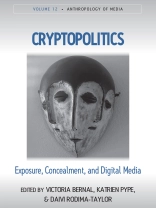Hidden information, double meanings, double-crossing, and the constant processes of encoding and decoding messages have always been important techniques in negotiating social and political power dynamics. Yet these tools, “cryptopolitics, ” are transformed when used within digital media. Focusing on African societies, Cryptopolitics brings together empirically grounded studies of digital media toconsider public culture, sociality, and power in all its forms, illustrating the analytical potential of cryptopolitics to elucidate intimate relationships, political protest, and economic strategies in the digital age.
Tabela de Conteúdo
List of Figures
Introduction: Cryptopolitics and Digital Media in Africa
Katrien Pype, Victoria Bernal, and Daivi Rodima-Taylor
Chapter 1. Four Ways of Not Saying Something in Digital Kinshasa: Or, On the Substance of Shadow Conversations
Katrien Pype
Chapter 2. The Power to Conceal in an Age of Social Media
Simon Turner
Chapter 3. KOT, Digital Practices and the Performance of Politics in Kenya
George Ogola
Chapter 4. The “Muslim Mali” Game: Revisiting the religious-security-post-colonial nexus in Malian popular culture
Marie Deridder and Olivier Servais
Chapter 5. Algorithmic Power in a Contested Digital Public: Crypto-politics and Identity in the Somali Conflict
Peter Chonka
Chapter 6. The Cryptopolitics of Digital Mutuality
Daivi Rodima-Taylor
Chapter 7. “This Dictatorship is a Joke: Eritrean Politics as Tragicomedy”
Victoria Bernal
Chapter 8. Digital Security in an African “Sanctuary City”
Lisa Poggiali
Conclusion: Studying Cryptopolitics
Daivi Rodima-Taylor, Katrien Pype, and Victoria Bernal
Index
Sobre o autor
Daivi Rodima-Taylor is a social anthropologist and researcher at the African Studies Center of the Pardee School of Global Studies of Boston University. Her research focuses on the intersection of financial technology and human economies. She recently co-edited the volume Land and the Mortgage: History, Culture, Belonging (Berghahn Books, 2022) and the special issue Fintech in Africa (Journal of Cultural Economy, 2022).












